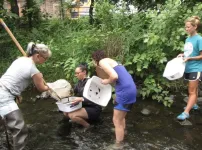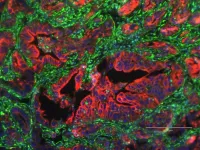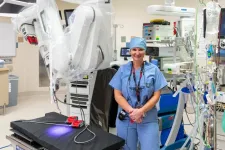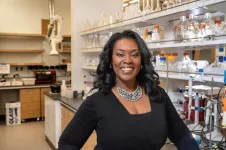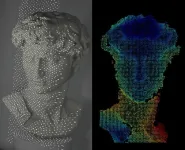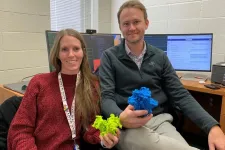(Press-News.org) (Millbrook, NY) Cary Institute for Ecosystem Studies is launching a new program to support high school and middle school educators in teaching global change and ecology. Starting in the summer of 2024, nine teachers will spend six weeks at Cary Institute conducting collaborative research in ecosystem science. Follow-up meetings throughout the school year will support the teachers as they develop and implement innovative curricula based on their research experiences.
The program is funded by a three-year award from the National Science Foundation as part of its Research Experiences for Teachers Sites in Biological Sciences (BIORETS) program. By building teachers’ scientific knowledge, skills, and confidence, the Cary BIORETS program will increase teachers’ capacity to develop and implement meaningful ecology learning experiences for their students.
“Students need to engage with ecology and STEM early, to instill confidence in them that this is a field they can pursue throughout their lives,” said community ecologist Jane Lucas, who will lead Cary BIORETS. “When people are better informed about big ecological processes, they are more invested in supporting a sustainable planet. By talking about global change early and often, we hope to build a collaborative and educated public that is excited about keeping our planet healthy.”
Who can participate in Cary BIORETS?
The program prioritizes educators from groups underrepresented in STEM, and those who work in schools that serve significant minority populations. Teachers from four under-resourced Hudson Valley school districts that serve both urban and rural populations have expressed interest in the program. Teachers from across the U.S. are invited to apply, with travel and housing covered. Participating teachers will receive an $8,800 stipend.
Rebecca Van Tassell, program coordinator for Cary BIORETS, emphasized that the program isn’t just open to biology teachers. “We would love math teachers to apply. We would love computer science and chemistry teachers to apply. The sticky, urgent problems of global change need to be approached through the thinking of many different disciplines so that we can come up with novel solutions.”
Cary BIORETS structure
During the six-week summer program at Cary Institute, educators will develop and complete an ecological research project under the mentorship of Cary scientists. Projects will explore new dimensions of ongoing Cary research related to wildfire, aquatic ecosystems, disease ecology, forests, nutrient cycling, and more. Depending on which project the teacher works on, they will have the opportunity to create and run simulations of future forest and fire dynamics, conduct field surveys of tick density and distribution, explore soil food webs, and identify tree species, among other skill-building activities.
Drawing on their research experiences, teachers will design new instructional materials to bring ecological concepts to their classrooms, with support from Cary Education staff and fellow teacher participants. Each educator is also required to share what they have learned, either by contributing to a professional publication, presenting at a conference, or conducting workshops in their school districts.
Throughout the school year, Cary Institute will host four virtual meetings to support teachers as they integrate their new curricula into the classroom setting. During these sessions, teachers will receive feedback on curricular materials, use protocols to analyze student work to determine the effectiveness of the new materials, and support each other to revise materials.
The entire process is designed to be highly collaborative, with fellow teachers offering mutual support for each other’s learning throughout the program.
A unique and empowering professional development opportunity
Cary BIORETS grows out of Cary Institute’s nearly 40 years of experience working with educatorsto co-create curricula and professional development programs.
Van Tassell said that one of the things that makes Cary BIORETS unique is that it is tailored to each teacher’s interests and classroom dynamics. “By letting teachers engage as learners in this authentic and inquiry-based way, we can work with them to develop materials that allow their students to learn in the same way,” said Van Tassell.
“Science is always an adventure, and experiments require a lot of creativity and trial and error,” said Lucas. “We often expose students to science with pre-set ‘experiments’ that have known endpoints. Rarely is this the case in science, and by bringing more research into the classroom, I hope it will provide students and teachers insight into what it is really like to be a scientist.”
More information about the program and details on how to apply are available on the Cary BIORETS website.
--
Cary Institute of Ecosystem Studies is an independent nonprofit center for environmental research. Since 1983, our scientists have been investigating the complex interactions that govern the natural world and the impacts of climate change on these systems. Our findings lead to more effective resource management, policy actions, and environmental literacy. Staff are global experts in the ecology of: cities, disease, forests, and freshwater.
END
Cary Institute receives NSF funding to offer ecological research experiences for teachers
Teachers will conduct paid summer research and develop innovative STEM curricula
2024-02-03
ELSE PRESS RELEASES FROM THIS DATE:
California voter poll: Schiff leads, while Porter and Garvey neck-and-neck for second in the U.S. Senate primary
2024-02-03
U.S. Rep. Katie Porter and former Los Angeles Dodger Steve Garvey are deadlocked in the race for second place in the U.S. Senate primary in California, according to a new poll on California politics and policies from USC; California State University, Long Beach; and Cal Poly Pomona.
U.S. Rep. Adam Schiff, a Democrat, leads all candidates with 25% of likely voters, according to the California Elections and Policy Poll. Porter, a Democrat, and Garvey, a Republican, each received support from 15%. Other candidates are in single digits, with Democratic U.S. Rep. ...
Researchers identify protein linked to metastasis in pancreatic cancer
2024-02-03
Pancreatic cancer is the No. 3 cause of cancer-related deaths in the United States, and only 12% of patients survive five years after being diagnosed. Severe pancreatic cancer is associated with metastasis, and it is this spread of secondary tumors that usually causes death, but little is known about the molecular mechanisms that drive metastasis.
In a study published Dec. 18 in Advanced Science, researchers from the University of California, Davis showed that abnormal expression of the protein Engrailed-1 (EN1) ...
Common food preservative has unexpected effects on the gut microbiome
2024-02-02
Food manufacturers often add preservatives to food products to keep them fresh. A primary purpose of these preservatives is to kill microbes that could break down and otherwise spoil the food. Common additives like sugar, salt, vinegar and alcohol have been used as preservatives for centuries, but modern-day food labels now reveal more unfamiliar ingredients such as sodium benzoate, calcium propionate, and potassium sorbate.
Bacteria produce chemicals called bacteriocins to kill microbial competitors. These chemicals can serve as natural preservatives by killing potentially dangerous pathogens ...
Single-port robotic surgery is making its debut in the mountain west
2024-02-02
Huntsman Cancer Institute at the University of Utah (the U) proudly introduces the first and only single-port robot in the Mountain West for head and neck surgical oncology patients. This state-of-the-art technology is a groundbreaking step in the field of oncological surgery, allowing for greater precision and less invasive procedures. Under the visionary leadership of dedicated healthcare professionals, the institute is committed to revolutionizing treatments for cancer patients.
“I am delighted that Huntsman Cancer Institute can now offer cancer patients in the Mountain West access to this innovative and life-changing technology,” says Sachin ...
Potential to ‘save more lives than doctors’: Rice launches WaTER Institute to develop accessible clean water technology
2024-02-02
Forty-three million Americans lack access to municipal water, and 1 in 10 people globally do not have access to safe drinking water. Rice University’s new WaTER Institute, launched today, aims to address this and other complex water-related challenges.
“Clean water can save more lives than doctors,” said Pedro J. Alvarez , the institute’s director and the George R. Brown Professor of Civil and Environmental Engineering.
The institute’s researchers will also predict and prevent diseases by monitoring wastewater; ...
New guidelines aim to elevate comprehensive care for people with severe epilepsy
2024-02-02
(February 2, 2024) The National Association of Epilepsy Centers (NAEC) has developed updated guidelines that outline the comprehensive services and resources epilepsy centers should provide to improve quality of care for people whose epilepsy is not well-controlled.
An Executive Summary of the 2023 Guidelines for Specialized Epilepsy Centers: Report of the National Association of Epilepsy Centers Guideline Panel was published online on February 2, 2024, in Neurology®, the medical journal of the American Academy of Neurology. The complete NAEC guidelines are published as an eAppendix on the journal’s website.
Epilepsy is one of the most ...
Welch Foundation supports Johnson-Winters' TB research
2024-02-02
With a $300,000 grant, the Welch Foundation is supporting University of Texas at Arlington research into why some types of Mycobacterium tuberculosis (Mtb), the bacteria that causes the lung disease tuberculosis (TB), do not respond to treatments.
Since its founding in 1954, the Houston-based Welch Foundation has contributed to the advancement of chemistry through research grants, departmental programs, endowed chairs and other special projects in Texas.
“As one of the nation’s largest private funding sources for chemical research, it is our job ...
A sleeker facial recognition technology tested on Michelangelo’s David
2024-02-02
Many people are familiar with facial recognition systems that unlock smartphones and game systems or allow access to our bank accounts online. But the current technology can require boxy projectors and lenses. Now, researchers report in ACS’ Nano Letters a sleeker 3D surface imaging system with flatter, simplified optics. In proof-of-concept demonstrations, the new system recognized the face of Michelangelo’s David just as well as an existing smartphone system.
3D surface imaging is a common tool used in smartphone facial recognition, as well as in computer vision and autonomous driving. These systems typically consist of a dot projector that contains multiple components: ...
Plant groupings in drylands support ecosystem resilience
2024-02-02
Many complex systems, from microbial communities to mussel beds to drylands, display striking self-organized clusters. According to theoretical models, these groupings play an important role in how an ecosystem works and its ability to respond to environmental changes. A new paper in PNAS focused on the spatial patterns found in drylands offers important empirical evidence validating the models.
Drylands make up 40 percent of the Earth’s landmass and are places where water is the limiting resource for life. They often display a characteristic ...
Scientists see an ultra-fast movement on surface of HIV virus
2024-02-02
DURHAM, N.C. – As the HIV virus glides up outside a human cell to dock and possibly inject its deadly cargo of genetic code, there’s a spectacularly brief moment in which a tiny piece of its surface snaps open to begin the process of infection.
Seeing that structure snap open and shut in mere millionths of a second is giving Duke Human Vaccine Institute (DHVI) investigators a new handle on the surface of the virus that could lead to broadly neutralizing antibodies for an AIDS vaccine. Their findings appear Feb. 2 in Science Advances.
Being able to attach an antibody specifically to ...
LAST 30 PRESS RELEASES:
A genetic brake that forms our muscles
CHEST announces first class of certified critical care advanced practice providers awarded CCAPP Designation
Jeonbuk National University researchers develop an innovative prussian-blue based electrode for effective and efficient cesium removal
Self-organization of cell-sized chiral rotating actin rings driven by a chiral myosin
Report: US history polarizes generations, but has potential to unite
Tiny bubbles, big breakthrough: Cracking cancer’s “fortress”
A biological material that becomes stronger when wet could replace plastics
Glacial feast: Seals caught closer to glaciers had fuller stomachs
Get the picture? High-tech, low-cost lens focuses on global consumer markets
Antimicrobial resistance in foodborne bacteria remains a public health concern in Europe
Safer batteries for storing energy at massive scale
How can you rescue a “kidnapped” robot? A new AI system helps the robot regain its sense of location in dynamic, ever-changing environments
Brainwaves of mothers and children synchronize when playing together – even in an acquired language
A holiday to better recovery
Cal Poly’s fifth Climate Solutions Now conference to take place Feb. 23-27
Mask-wearing during COVID-19 linked to reduced air pollution–triggered heart attack risk in Japan
Achieving cross-coupling reactions of fatty amide reduction radicals via iridium-photorelay catalysis and other strategies
Shorter may be sweeter: Study finds 15-second health ads can curb junk food cravings
Family relationships identified in Stone Age graves on Gotland
Effectiveness of exercise to ease osteoarthritis symptoms likely minimal and transient
Cost of copper must rise double to meet basic copper needs
A gel for wounds that won’t heal
Iron, carbon, and the art of toxic cleanup
Organic soil amendments work together to help sandy soils hold water longer, study finds
Hidden carbon in mangrove soils may play a larger role in climate regulation than previously thought
Weight-loss wonder pills prompt scrutiny of key ingredient
Nonprofit leader Diane Dodge to receive 2026 Penn Nursing Renfield Foundation Award for Global Women’s Health
Maternal smoking during pregnancy may be linked to higher blood pressure in children, NIH study finds
New Lund model aims to shorten the path to life-saving cell and gene therapies
Researchers create ultra-stretchable, liquid-repellent materials via laser ablation
[Press-News.org] Cary Institute receives NSF funding to offer ecological research experiences for teachersTeachers will conduct paid summer research and develop innovative STEM curricula
